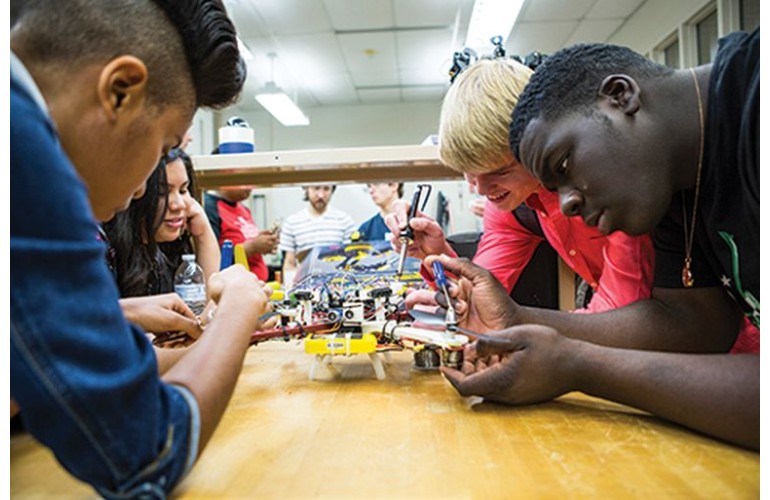 Subscribe
Subscribe- Login
-
/
Sign Up
- US Black Engineer
- >>
- Articles
- >>
- EDUCATION
- >>
- On Campus
- >>
- Engineering Change: New ABET Issue Brief
|
Getting your Trinity Audio player ready...
|
To keep pace with rapid change, engineering programs in colleges and universities across the country are blurring the lines between class and career and increasing access to hands-on learning. In a new paper, ABET provides a glimpse into best practices within engineering programs and the benefits that have been realized.
ABET, the accreditor of college and university programs in science, technology, engineering, and math (STEM) disciplines, explores innovations in the design and delivery of engineering programs.
“Engineering Change: Lessons from Leaders on Modernizing Higher Education Engineering Curriculum” offers case studies from six undergraduate engineering programs at Olin College, Capitol Technology University, Worcester Polytechnic Institute, Rose-Hulman Institute of Technology, Massachusetts Institute of Technology, and Rice University.
“The delivery of STEM curriculum in the age-old tradition of higher education is no longer effective for the business needs of today and tomorrow,” says ABET CEO Michael Milligan. “If we will meet the current and future demands for dynamic engineering talent, universities must rethink the role of engineers in our society and offer curriculum that prepares them to meet and overcome the challenges confronting the world today and tomorrow.”
In researching each of the stories outlined above, six distinct themes — lessons learned — emerged as central to the design of effective and flexible engineering program design:
1. The blurring of disciplinary borders: Higher education is no longer a straight line within any given program area. Rather, the most compelling programs are those that blend learning across many diverse program areas.
2. A holistic approach to problem-solving: Learning to solve a problem is about much more than memorizing the math equation. By deeply engaging real-world practice into the classroom, students learn beyond the theory in a way that can make them better problem solvers for life.
3. Informed by business: From cross-sector learning to corporate pipeline programs embedded inside the classroom, innovation in education is increasingly important in building tangible success for graduates, as well as the universities in which those students thrive.
4. Customizable curriculum: Flexing with the needs of the business community has become critical for universities to show value to students and corporate partners, as is the process for allowing students an opportunity to chart their own course, with flexibility and choice in program elements.
5. Dynamic, hands-on learning: The environment in which one learns, tests and problem-solves is just as important as the frame in which one is learning. Exposing students earlier to real-world challenges is increasingly important as society confronts the demanding population and infrastructure challenges of the next several decades. This emphasis and approach to problem-solving came across clearly in all programs we examined. Teamwork and project-based are the new principles of education. Universities must go beyond theory to bring practical experiences from outside of the classroom into the learning environment.
6. Effective Assessment: Curriculum is no longer static. Through regular and effective assessment, as provided by ABET and other program accreditors, universities have the tools and confidence needed to be the best they can be for their students, donors and corporate partners.
ABET accredited engineering schools at historically black colleges and universities: 
Alabama A&M College of Engineering, Technology, and Physical Sciences
Florida A&M University – Florida State University College of Engineering
Hampton University School of Engineering & Technology
Howard University College of Engineering, Architecture and Computer Sciences
Jackson State University College of Science, Engineering, and Technology
Morgan State University Clarence M. Mitchell, Jr. School of Engineering
Howard’s College of Engineering
Hampton University School of Engineering & Technology
North Carolina A&T University College of Engineering
Norfolk State University College of Science, Engineering, and Technology
Prairie View A&M University Department of Engineering Technology
Southern University and A&M College Department of Electrical Engineering
Tennessee State University College of Engineering
Tuskegee University College of Engineering
University of the District of Columbia School of Engineering and Applied Sciences
University of Maryland Eastern Shore Department of Engineering and Aviation Sciences
Virginia State University School of Engineering, Science, and Technology
ABET, a nonprofit organization recognized by the Council for Higher Education Accreditation, accredits college and university programs in the STEM disciplines. With ABET accreditation, students, employers, and society can be confident that a program meets the quality standards that produce graduates prepared to enter a global workforce.
For more information and to download “Engineering Change,” visit ABET


